直接引语和间接引语详解与练习
直接引语和间接引语用法及练习(含答案)
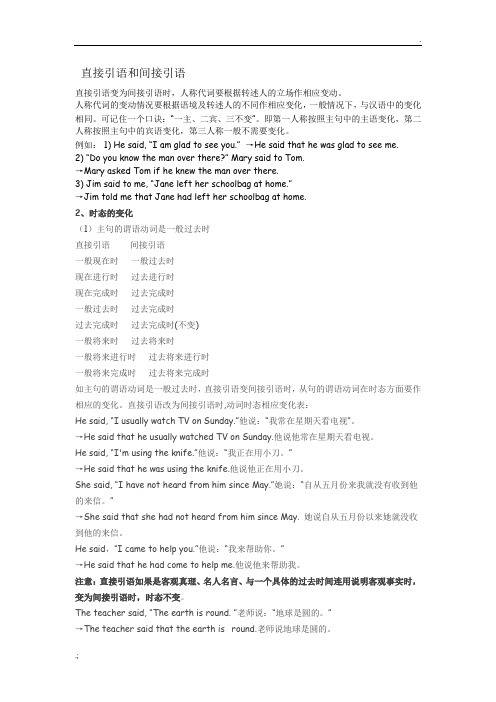
直接引语和间接引语直接引语变为间接引语时,人称代词要根据转述人的立场作相应变动。
人称代词的变动情况要根据语境及转述人的不同作相应变化,一般情况下,与汉语中的变化相同。
可记住一个口诀:“一主、二宾、三不变”。
即第一人称按照主句中的主语变化,第二人称按照主句中的宾语变化,第三人称一般不需要变化。
例如: 1) He said, “I am glad to see you.”→He said that he was glad to see me. 2) “Do you know the man over there?” Mary said to Tom.→Mary asked Tom if he knew the man over there.3) Jim said to me, “Jane left her schoolbag at home.”→Jim told me that Jane had left her schoolbag at home.2、时态的变化(1)主句的谓语动词是一般过去时直接引语间接引语一般现在时一般过去时现在进行时过去进行时现在完成时过去完成时一般过去时过去完成时过去完成时过去完成时(不变)一般将来时过去将来时一般将来进行时过去将来进行时一般将来完成时过去将来完成时如主句的谓语动词是一般过去时,直接引语变间接引语时,从句的谓语动词在时态方面要作相应的变化。
直接引语改为间接引语时,动词时态相应变化表:He said, “I usually watch TV on Sunday.”他说:“我常在星期天看电视”。
→He said that he usually watched TV on Sunday.他说他常在星期天看电视。
He said, “I'm using the knife.”他说:“我正在用小刀。
”→He said that he was using the knife.他说他正在用小刀。
直接引语间接引语(含练习有答案)
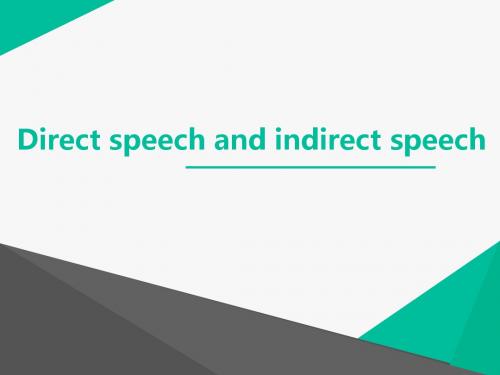
He told me that he _______ met her the day _______.
6. “You must come here before five,” he said.
He said that I _______ to go _______ before five.
“I like these better than she does,” he said to me.
He told me that he liked those better than she did.
主句动词的使用
用间接引语时,主句动词除了使用say, tell ,ask外,只要 意思上允许,尽可能用别的动词,如:
感叹句变为间接引语时,可以加上适当的修饰词,如with delight(高兴),with a sigh(叹息)等
we said,"what a clever monkey it is!" we said what a clever monkey it was. =we said that it was a clever monkey.
变为间接引语中的时态 一般过去时 过去完成时 过去完成时 过去将来时 过去进行时 过去完成进行时 should should would might might could could
He said,"your young brother broke it." 一般过去时 He said that my young brother had broken it. 过去完
Direct speech and indirect speech
高中英语语法直接引语和间接引语含练习题

高中英语语法直接引语和间接引语含练习题直接引语与间接引语一.基本概念1、直接引语:一字不改地引述别人的话He said,“I am a student.”(带引号)2.间接引语:用说话人自己的话转述别人的话 He said he was a student.二.直接引语变间接引语(一)(人称变换规则同下)1.如果直接引语所在的句中的谓语动词是现在时或将来时态,改为间接引语时,时态不变.Eg.He says “I didn’t go to school today.”He says that he didn’t go to school that day .2.如果直接引语讲述的是客观真理现象,改为间接引语时,其一般现在时不变. Eg.The teacher said ,“The earth is round .”The teacher said that the earth is round .三.直接引语变间接引语(二)1.如果说话时间与引述时间不同,即引述某人过去说过的话,则动词时态要作相应的变化即动词时态一律向过去推移一步.(主句为过去式时)2.变换规则(指的是间接引语中的从句部分)(1)人称的变化 ------ 一随主,二随宾,三不变(2)指示代词、时间状语、地点状语和动词的变化1〉指示代词的变化this---- that these----those2〉时间状语的变化now---- then,ago---- before,today----that day,yesterday----the daybefore,tomorrow----the next day,the day before yesterday----two daysbefore,the day after tomorrow----two days later,nextweek/month,etc.---- the next week/month,/doc/2a17542514.html,stweek/month,etc.---- the week/month before3〉地点状语的变化here----there4〉动词的变化come----go(3)时态的变化1〉一般现在时-------一般过去时2〉现在进行时-------过去进行时3〉现在完成时-------过去完成时4〉一般过去时-------过去完成时5〉过去完成时-------过去完成时6〉一般将来时-------过去将来时四.变换类型1.直接引语为陈述句直接引语为陈述句,用that引导(口语中可以省略).e.g.直接引语:The teacher told the students,“I will give you a surprise.”间接引语:The teacher told the students that she would give them asurprise.2.直接引语为疑问句(1)直接引语为一般疑问句时,由whether或if引导,用陈述句的语序e.g.直接引语:He said to us,“Are you going away today?”间接引语:He asked us whether/if we were going away that day.直接引语为疑问句(2)直接引语为特殊疑问句时,其关联词用相应的疑问代词或疑问副词,其后用陈述语序e.g.直接引语:She asked,“Who will help me finish the job?”间接引语:She asked who would help her finish the job.e.g.直接引语:He asked,“What have you done?”间接引语:He asked what I had done.直接引语为疑问句(3)直接引语为选择疑问句,变为间接引语时应用whether…or…e.g.直接引语:“Do you like tea or coffee?” she asked me.间接引语:She asked me whether I liked tea or coffee.3.直接引语为祈使句直接引语为祈使句,变为间接引语时将祈使句的动词原形变为带to 的不定式.它的否定是在to前加not.它没有时态的变化.其他的变化和直接引语是陈述句的情况相同.e.g.直接引语:I said to her,“Please give me a glass of wa ter.”间接引语:I asked her to give me a glass of water.直接引语:He said,“Don’t make so much noise,boys.”间接引语:He told the boys not to make so much noise.4.直接引语为感叹句直接引语若是感叹句,变为间接引语时多采用宾语从句结构,即可用what或how 引导,也可用that引导e.g.直接引语:“What a clever boy you are!”,my teacher said to him.间接引语:My teacher told him what a clever boy he was.My teacher told him that he was a very clever boy.英语小题集练——直接引语和间接引语1、— Could you tell me ______?—Yes. It’s next to the supermarket.A.where the post office isB.where was the post officeC.where is the post officeD.where the post office was2、My brother said, “I’m watching TV now.”My brother said watching TV .A.he, was, now B.I, was, thenC.I, am, that day D.he, was, then3、—Do you know____________?—It’s about ten minutes’ walk.A.how many minutes do you walk to the nearest hospital B.which is the way to the nearest hospitalC.how long did you reach the nearest hospitalD.how far it is to the nearest hospital from here4、-- Do you know ________ the new computer yesterday? -- Sorry, I have no idea.A.how much did she pay for B.how much will she pay for C.how much she paid for D.how much she will pay for5、Jenny is on holiday now. I wonder ________.A.when she will come back B.when she came backC.when will she come back D.when did she come back6、Would you please tell me ______ this book?A.where you bought B.where did you buyC.where you buy D.where do you buy7、— Could you tell me_____ ?— About half an hour.A.how long it takes to walk to the Science and Technology Museum from schoolB.how long it took to walk to the Science and Technology Museum from schoolC.how far was it to walk to the Science and TechnologyMuseum from schoolD.how far it was to walk to the Science and Technology Museum from school.8、I ______ that he’s a hardw orking teacherA.never doubt B.always doubt C.seldom ask D.often wonder答案1、2、3、4、5、6、7、8、直接引语和间接引语专项练习一、把下列的句子变成间接引语:1. “I’m leaving for London next week.” My sister said to me.2. John said, “Mr. Smith has come here.”3. She said, “Do you want me to help you?”4. “Does the man in the shop find his wallet at last?” She said.5. Mum said to the newcomer, “Can you speak English?”6. “How many people are there in your family?” He asked the boy.7. He said to me, “I have left my book in your room.”8. Kitty said “I’ll call again after supper this evening.”9. S he said, “I will come here again tonight.”10. He said, “I arrived yesterday morning.”11. She said , “My sister will be back tomorrow morning.”12. “Who lives next door?” she asked.13. He said , “I have lost my umbrella.”14. Paul said, “I’m trying to get a taxi.”15. “Frank, I came to return you the book,” Henry said.16. He asked me, “Are you a teacher or a student?”二、把下列句子变成直接引语:23. Father asked me who had broken the window.24. She asked me which one I liked the best.25. He asked whether I had watched TV the night before.26. Jim asked me if I was busy that day.27. Pick said that he would take Mary there the next time.三、扩展练习:宾语从句。
高中直接引语和间接引语转化详解(含习题及答案)

直接引语和间接引语转化详解引用别人的话有两种方式,一种是讲述别人的原话,并把它放在引号里,这叫直接引语;另一种是用自己的话来转述别人,并且不能用引号,这就是间接引语。
直接引语和间接引语之间可以互相转换。
扩展1、直接引语如果表示客观真理,变间接引语时,时态不变。
2、直接引语若有明确的表示时间的词语,变间接引语时,时态不变。
3、若直接引语中含有c o u l d,m u s t,s h o u l d等情态动词,变间接引语时,时态不变。
4、直接引述别人的原话,叫直接引语。
5、用自己的话转述别人的话,叫间接引语。
直接引语变间接引语的五点变化1.时态变化直接引语变为间接引语时,若主句为过去时态,变为宾语从句的时态如下表:"l l i k e E n g l i s h v e r y m u c h,"h e s a i d.他说:“我很喜欢英语。
”→H e s a i d t h a t h e l i k e d E n g l i s h v e r y m u c h.H e s a i d,"I t w i l l r a i n s o o n."他说:“很快就会下雨。
”→H e s a i d t h a t i t w o u l d r a i n s o o n.注意:[1]若直接引语为客观真理,则变为间接引语时时态不变:T h e t e a c h e r s a i d t o u s,"K n o w l e d g e i s p o w e r."老师对我们说:“知识就是力量”→T h e t e a c h e r t o l d u s t h a t k n o w l e d g e i s p o w e r.[2]有时由于直接引语有特定的过去时态状语,变为间接引语时时态也可不变:H e s a i d,”M y d a u g h t e r w a s b o r n i n1997."他说:“我的女儿是1997年出生的。
直接引语和间接引语及练习及答案
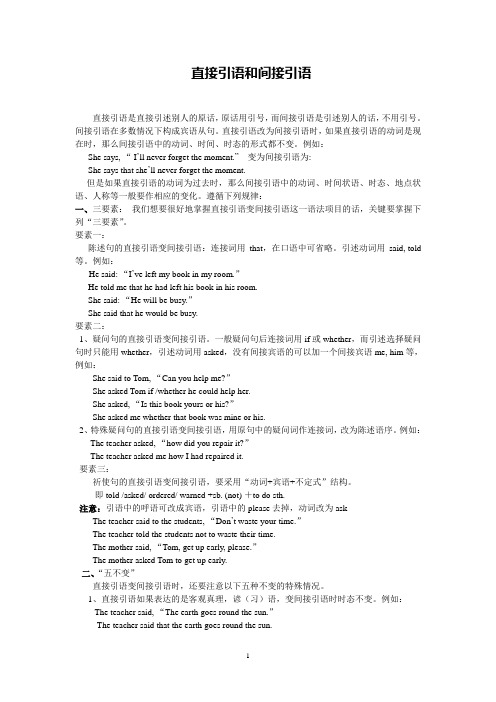
直接引语和间接引语直接引语是直接引述别人的原话,原话用引号,而间接引语是引述别人的话,不用引号。
间接引语在多数情况下构成宾语从句。
直接引语改为间接引语时,如果直接引语的动词是现在时,那么间接引语中的动词、时间、时态的形式都不变。
例如:She says, “ I’ll never forget the moment.”变为间接引语为:She says that she’ll never forget the moment.但是如果直接引语的动词为过去时,那么间接引语中的动词、时间状语、时态、地点状语、人称等一般要作相应的变化。
遵循下列规律:一、三要素:我们想要很好地掌握直接引语变间接引语这一语法项目的话,关键要掌握下列“三要素”。
要素一:陈述句的直接引语变间接引语:连接词用that,在口语中可省略。
引述动词用said, told 等。
例如:He said: “I’ve left my book in my room.”He told me that he had left his book in his room.She said: “He will be busy.”She said that he would be busy.要素二:1、疑问句的直接引语变间接引语。
一般疑问句后连接词用if或whether,而引述选择疑问句时只能用whether,引述动词用asked,没有间接宾语的可以加一个间接宾语me, him等,例如:She said to Tom, “Can you help me?”She asked Tom if /whether he could help her.She asked, “Is this book yours or his?”She asked me whether that book was mine or his.2、特殊疑问句的直接引语变间接引语,用原句中的疑问词作连接词,改为陈述语序。
初中英语语法:直接引语变间接引语详解附练习及答案

直接引语和间接引语Direct speech and Indirect speech1.什么是直接引语?----直接引述别人的原话,一般加冒号,且没有时态呼应的问题;如:He said, “I’m afraid I can’t finish the work.”2.什么是间接引语?-----用自己的话转述别人的话,不用引号,通常情况构成宾语从句,从句中的语序,时态,人称,时间状语,地点状语,和指示代词等都有变化。
如:He said that he was afraid he couldn’t finish the work.3. 为什么要把直接引语变成间接引语?----当你需要转述别人的话的时候就需要用到;除了用say,还可以用tell, ask等。
4.所转述的内容可以是陈述句,疑问句,特殊疑问句,祈使句,感叹句,这几种情况下该怎么将直接引语变成间接引语呢?只要记住刚刚说的那6点:语序,时态,人称,时间状语,地点状语,和指示代词,记住相对应的变化规则,那么就不是一件难事。
下面我们来看例子:直接引语:He said, “My dad will be back tomorrow morning”间接引语:He said that his dad would be back the next/following morning..我们来分析一下这个例句,时态,人称,时间状语都发生了变化My dad---his dad, will be back---would be back, tomorrow morning---the next/following morning一、下面我们先看时态不变的5种情况:1)直接引语是客观真理,自然现象,名言,俗语,或者与一个具体的过去时间连用说明客观事实时,不管主句的谓语动词是什么时态,变为间接引语的时候时态均不变,如:Eg.1---“The earth moves around the sun,” the teacher told us.The teacher told us the earth moves around the sun.Eg.2---He said, “I was born in Guangdong in 1990”.He said he was born in Guangdong in 1990.Eg.3---Goethe said, “The important thing in life is to have a great aim, and the determination to attain it.”Goethe said the important thing in life is to have a great aim, and the determination to attain it.Eg.4:He said, “Practice makes perfect.”He said that practice makes perfect.2)主句的谓语动词是现在是或将来时,变成间接引语时时态不变Eg.1---He says, “I finished the work.”He says he finished the work.Eg.2---He will say, “I have watered the flower.”He will say he has watered the flower.Eg.3---He will say, “I will try my best to help you.”He will say he will try his best to help me.3)直接引语如果是一般现在时,表示反复出现或习惯性动作,变为间接引语时时态不变。
高中直接引语和间接引语详解和习题

直接引语和间接引语详解与习题一、直接引语和间接引语的定义1. 直接引语:别人直接说的话,一般直接放在引号内。
如:(1) My mother told me, “You should finish your homework first, then you can play with your friends.”(2) Our teacher said, “Class is over, we should have a rest.”2. 间接引语:用自己的话加以转述,被转述的话不放在引号内。
上面两个例句变成间接引语应该是:(1) My mother told me that I should finish my homework first and then I could go out and play with my friends.(2) Our teacher said class was over and we should have a rest.二、直接引语与间接引语的变化直接引语变成间接引语时,由于引述动词(said, told等)一般都是过去时形式,因此间接引语中的动词时态、人称代词、限定词、时间状语、地点状语等一般都要做相应的变化。
有下面几种情况:1. 现在时间推移到过去时间所谓现在时间推移到过去时间指一般现在时变为一般过去时,现在进行时变成过去进行时,现在完成时变成过去完成时。
例如:She said, “I am hungry.” T She said (that) she was hungry.Vince said, “I have found what,s wrong with the computer.” T Vince said he had found what was wrong with the computer.在下列场合,尽管陈述动词为过去时形式,间接引语中的动词时态却不必改变,即:(1)当引述的是客观事实、科学真理、现在习惯工作以及格言等内容时:He said, “The word 'laser, is an acronym首字母缩略词).” T He said the word 'laser,is an acronym.(2)当动词所表示的状态或动作在引述时仍在继续时:“I,m forty,” he said. t He said he is forty.(3)当谓语动词包含无过去时形式的情态助动词时:He said, “It must be pretty late. I really must go.” — He said it must be pretty late, and he really must go.He said, “You mustn’t smoke in the room.”—He said I mustn’t smoke in the room. 2. 过去时间推移到过去的过去这里需要注意以下几点:(1)当强调动作或状态先于引述动词时,一般过去时要变成过去完成体。
初中英语直接引语和间接引语(含练习题和答案)

直接引语和间接引语Direct Speech and Indirect Speech直接引述别人的原话,叫直接引语。
用自己的话转述别人的话,叫间接引语。
间接引语在多数情况下构成宾语从句。
直接引语一般前后要加引号;间接引语不用引号。
例如:直接引语:Mr. Black said, “I’m busy.”间接引语:Mr. Black said that he was busy.1.陈述句直接引语如果是陈述句,变为间接引语时,用连词that引导(that在口语中常省略),从句中的人称、时态、指示代词、时间状语、地点状语等要作相应的变化。
(1)人称的变化• He said, “I like it very much.”→ He said that he liked it very much.• He said, “I’ve left my book in your room.”→ He told me that he had left his book in my room.(2)时态的变化如主句的谓语动词是一般过去时,直接引语变间接引语时,从句的谓语动词在时态方面要作以下的变化:• He said, “I saw the film yesterday.”→ He said that he had seen the film the day• She said, “I have seen the film. It is good. ”→ She said that she had seen the film.直接引语如果是客观真理,变为间接引语时,时态不变。
例如:• He said, “Light travels much faster than sound.”→ He said that light travels much faster than sound.(3)指示代词、时间状语和地点状语的变化• She said, “I will come this evening.”→ She said that she would go that evening.• He said, “My sister was here three days ago, but she is not here now.”→ He said that his sister had been there three days before but she was not here then.现将这几种变化列表如下:以上这些变化,要根据说话的实际情况来定。
直接引语和间接引语讲解和练习(答案)

直接引语和间接引语直接引述别人的原话,叫做直接引语;用自己话转述别人的话,叫做间接引语。
间接引语一般构成宾语从句。
直接引语必须放在引号内,间接引语则不用引号。
直接引语改为间接引语时,除将引语部分变成宾语从句外,还必须对直接引语中的人称、时态、指示代词、时间状语、地点状语等进行改变。
直接引语转成间接引语的时态变化:1、当主句谓语动词是一般现在时态或一般将来时态宾语从句的谓语动词的时态不作任何变化。
如:He said, ”We help each other. ” = He said that they help each other.She said, ” I have bought a dictionary. ” = She said that she had bought a dictionar y.She said, ” He will go to the hospital. ” = She said that he would go to the hospital.注意:主句谓语动词是一般过去时态动词表示客观真理仍用一般现在时态,不必变为过去时态。
如:The teacher said, “Light travels much faster than sound.”= The teacher said light travels much faster than sound.2.在人称方面存在人称的变化,变化规律常常是:(1)直接引语中的第一人称常跟主句的主语一致。
e.g.He said,“I have finished my homework.”→He said(that)he had finished his homework.(2)直接引语中的第二人称常常依主句中位于动词后面的谈话对象而定,若后面没有谈话对象,则常变为第一人称。
e.g.Tom said,“You must finish your homework today.”→Tom said I had to finish my homework that day.(3)直接引语中的第三人称变为间接引语时, 常不变。
八下英语专题_直接引语和间接引语讲解及练习

八下英语专题_直接引语和间接引语讲解及练习直接引语和间接引语讲解及练习直接引述别人的原话,叫直接引语。
用自己的话转述别人的话,叫间接引语。
例:.“What’s you name?” she asked.He replied that he was going by train.(一)将直接引语变为间接引语时要做一些相应的变化,主要有以下几种情况。
1 人称的变化(一随主、二随宾、三不变)直接引语变间接引语相当于把直接引语变为宾语从句。
因此直接引语的人称要做相应变化。
①一随主直接引语的主语为第一人称时,变为间接引语要和主句的主语保持一致。
He said: “I will go to Beijing tomorrow.”He said that he would go to Beijing the next day.②二随宾直接引语的主语为第二人称时,要和主句的宾语保持一致。
例:He said to me: “You will leave tomorrow.”He told me that I would leave the next day.③三不变直接引语是第三人称为主语时,变间接引语时不变。
例:He said to me: “My sister will leave tomorrow.”He told me that his sister would leave tomorrow.He said to us: “They want to come.”He told us that they wanted to go.2.时态的变化①如果主句是过去式时,从句做相对应变化. 如下一般现在时→一般过去时(谓语变化:)一般将来时→过去将来时(谓语变化:)现在进行时→过去进行时(谓语变化:)一般过去时→过去完成时(谓语变化:)现在完成时→过去完成时(谓语变化:)情态动词的变化()*直接引语如果是客观真理,变间接引语时,时态用一般现在时。
直接引语和间接引语的用法及练习题附答案

11.He said,“We are still students.’
→
12.He said to me,“I was born in 1978.”
→
13.The engineer said,“I was at college in 1967.”
→
14.He said,“I have studied English since I was a boy.”
(2) "Would you mind opening the window?" he asked.
→He asked me to open the window.
"Why don't you take a walk after supper?" he asked .
→he advised me to take a walk after supper.
"Shall we listen to the music?" he asked.
→He suggested listening to the music.
4.直接引语是感叹句时
间接引语为what或how引导,也可以用that引导。
She said, "What a lovely day it is !"
He said“Iam angry.”
He told me that he was angry.
(2)现在进行时变为过去进行时
(3)一般将来时变为过去将来时
(4)现在完成时变为过去完成时
(5)一般过去时变为过去完成时
Mr. Green said to them,“Joe told me all about his story when he asked for a job.”
直接引语和间接引语的用法及练习题(附答案)

直接引语和间接引语的用法引述别人的话有两种方式:一是使用引号引出人家的原话,这叫做直接引语;二是用自己的话把人家的话转述出来,被转述的话不放在引号内,这叫做间接引语。
例如:John said, "I'm going to London with my father."约翰说:"我要和父亲到伦敦去。
"(引号内是直接引语)John said that he was going to London with his father.约翰说,他要和他父亲去伦敦。
(宾语从句是间接引语)间接引语在大多数情况下是一个宾语从句,直接引语变成间接引语时,要注意以下几点:人称、时态、指示代词、时间状语、地点状语、动词、句式的变化以及宾语从句要用陈述句语序。
一、如何变句型:1.直接引语是陈述句时,间接引语改为that引导的宾语从句(口语中that可以省略),主句的引述动词主要有say ,tell, repeat, explain, think等。
He said , "You are younger than I."-'He said (that ) I was younger than him.2. 直接引语是疑问句时,间接引语为陈述语序:主句的谓语动词say 改为ask,或改为wonder, do not know, want to know, be not sure, be puzzled等。
(1)直接引语是一般疑问句或反意疑问句时,间接引语变为if (whether)引导的宾语从句。
She said, "Do you often come here to read newspapers?"→She asked me if (或whether)I often went there to read newspapers.She asked me , "You have seen the film, haven't you?" →She asked me whether(或if )I had seen the film. 注意:大多数情况下,if 和whether 可以互换,但后有or not,或在动词不定式前,或放在介词后作连接词时,一般只用whether。
直接引语变间接引语讲解及练习
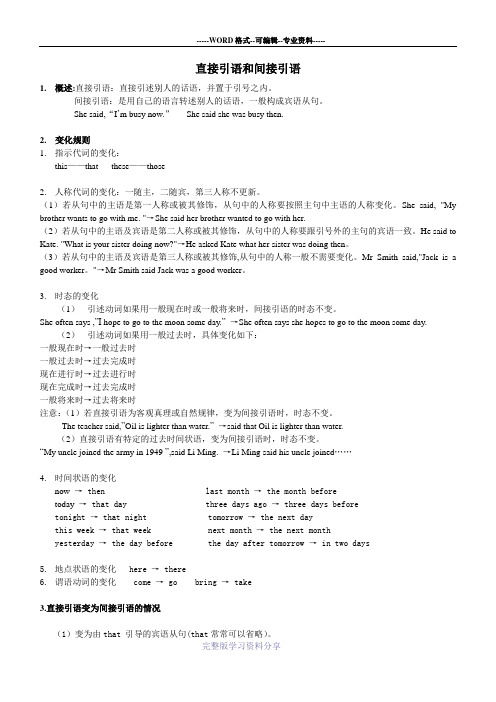
直接引语和间接引语1.概述:直接引语:直接引述别人的话语,并置于引号之内。
间接引语:是用自己的语言转述别人的话语,一般构成宾语从句。
She said,“I’m busy now.”She said she was busy then.2. 变化规则1.指示代词的变化:this——that these——those2.人称代词的变化:一随主,二随宾,第三人称不更新。
(1)若从句中的主语是第一人称或被其修饰,从句中的人称要按照主句中主语的人称变化。
She said, "My brother wants to go with me. "→She said her brother wanted to go with her.(2)若从句中的主语及宾语是第二人称或被其修饰,从句中的人称要跟引号外的主句的宾语一致。
He said to Kate. "What is your sister doing now?"→He asked Kate what her sister was doing then。
(3)若从句中的主语及宾语是第三人称或被其修饰,从句中的人称一般不需要变化。
Mr Smith said,"Jack is a good worker。
"→Mr Smith said Jack was a good worker。
3.时态的变化(1)引述动词如果用一般现在时或一般将来时,间接引语的时态不变。
She often says ,”I hope to go to the moon some day.”→She often says she hopes to go to the moon some day.(2)引述动词如果用一般过去时,具体变化如下:一般现在时→一般过去时一般过去时→过去完成时现在进行时→过去进行时现在完成时→过去完成时一般将来时→过去将来时注意:(1)若直接引语为客观真理或自然规律,变为间接引语时,时态不变。
直接引语和间接引语讲解与习题

间接引语
that those Then That day That evening The day before The morning before The night before Two days before The next week The next day Two days before In two day‟s time
2.
只着眼于转述事实,而不侧重动作先于转述动作的时间时。
例子:The boy said. „„I found the dog just at the edge of the wood.” 变成:The boy said that he found the dog just at the edge of the wood. 小男孩说他在森林边发现了那条狗。
时态不需要变化的情况(共10种)
1. 直接引语有确定的过去时间时。
例子:He said, „„the story took place in the 1930s.” 变成:He said tha the story took place in the 1930s. 他说这个故事发生在20世纪30年代。
5.When,
while, since等引导时间状语从句时。
例子:He said, „„ It is many years since he came to live here.” 变成:He said that it was years since he came to live here. 他说他住在这里已经很多年了。
查理告诉我说他现在正在农场帮他爸爸干活。
4.所转述的是自然现象、科学真理、名言警句等,并对此加以强
调时。
例子:Our Enlish teacher said, „„All work no play makes Jack a dull boy.” 变成:Our Enlish teather told us tht all work no play makes Jack a dull boy. 我们的英语老师告诉我们,只顾学习不玩耍,聪明孩子也变傻。
初中英语语法:直接引语变间接引语详解附练习及答案

直接引语和间接引语Direct speech and Indirect speech1.什么是直接引语?----直接引述别人的原话,一般加冒号,且没有时态呼应的问题;如:He said, “I’m afraid I can’t finish the work.”2.什么是间接引语?-----用自己的话转述别人的话,不用引号,通常情况构成宾语从句,从句中的语序,时态,人称,时间状语,地点状语,和指示代词等都有变化。
如:He said that he was afraid he couldn’t finish the work.3. 为什么要把直接引语变成间接引语?----当你需要转述别人的话的时候就需要用到;除了用say,还可以用tell, ask等。
4.所转述的内容可以是陈述句,疑问句,特殊疑问句,祈使句,感叹句,这几种情况下该怎么将直接引语变成间接引语呢?只要记住刚刚说的那6点:语序,时态,人称,时间状语,地点状语,和指示代词,记住相对应的变化规则,那么就不是一件难事。
下面我们来看例子:直接引语:He said, “My dad will be back tomorrow morning”间接引语:He said that his dad would be back the next/following morning..我们来分析一下这个例句,时态,人称,时间状语都发生了变化My dad---his dad, will be back---would be back, tomorrow morning---the next/following morning一、下面我们先看时态不变的5种情况:1)直接引语是客观真理,自然现象,名言,俗语,或者与一个具体的过去时间连用说明客观事实时,不管主句的谓语动词是什么时态,变为间接引语的时候时态均不变,如:Eg.1---“The earth moves around the sun,” the teacher told us.The teacher told us the earth moves around the sun.Eg.2---He said, “I was born in Guangdong in 1990”.He said he was born in Guangdong in 1990.Eg.3---Goethe said, “The important thing in life is to have a great aim, and the determination to attain it.”Goethe said the important thing in life is to have a great aim, and the determination to attain it.Eg.4:He said, “Practice makes perfect.”He said that practice makes perfect.2)主句的谓语动词是现在是或将来时,变成间接引语时时态不变Eg.1---He says, “I finished the work.”He says he finished the work.Eg.2---He will say, “I have watered the flower.”He will say he has watered the flower.Eg.3---He will say, “I will try my best to help you.”He will say he will try his best to help me.3)直接引语如果是一般现在时,表示反复出现或习惯性动作,变为间接引语时时态不变。
初中直接引语变间接引语讲解与练习

初中直接引语变间接引语讲解与练习直接引语和间接引语概述1.我们把引述别人的话语可归纳为两种方式,一种是直接引述别人的话语,并置于引号之内的称为直接引语,另一种是用自己的语言转述别人的话语,称为间接引语,间接一般构成宾语从句。
The teacher asked, “Do you like English?”老师问:“你喜欢英语吗?”(直接引语)The girl said that she liked English very much. 这个女孩说她非常喜欢英语。
(间接引语)2.一般在直接引语或间接引语当中都有一个引述动词,如tell, ask, say等。
这些引述动词和它们的主语所放位置比较灵活,可以放在直接引语之前、之后或其中。
主语如果是名词时,可以倒装。
“主语+引述动词”放在间接引语当中就相当于宾语从句的主语部分。
He told me, “I am going to Changchun tomorrow.”他告诉我:“明天我打算去长春。
”“Where are you from?” asked Linda. “你来自哪里?”琳达问。
直接引语变间接引语的变化形式1.人称代词和指示代词的变化指示代词this 和these通常变为that和those 。
人称代词也要根据情况做适当调整。
从句中的第一人称多变为第三人称,第二人称根据情况改为第一人称或第三人称,第三人称不变。
例如:He said, “I came to help you.”他说:“我是来帮助你的。
”→He said that he had come to help me.他说他是来帮助我的。
2.时态的变化(1)引述动词如果用一般现在时或一般将来时,间接引语的时态不变。
(2)引述动词如果用一般过去时,间接引语的时态要变成相应的过去时态的一种。
具体变化如下:一般现在时→一般过去时一般过去时→过去完成时现在进行时→过去进行时现在完成时→过去完成时一般将来时→过去将来时(1)含有情态动词的直接引语变成间接引语是,情态动词也要相应地变成过去时态。
新目标八下直接引语和间接引语讲解及练习题

直接引语和间接引语直接引述别人的话,叫“直接引语”。
用自己的话转别人的话叫间接引语,间接引语在多数情况下构成宾语从句。
直接引语一般前后要加引号,间接引语不用引号。
1.直接引语是陈述句,变间接引语时,用连词that引导(that在口语中常省略,从句中的人称,时态,指示代词,时间状语,地点状语等要做相应的变化。
(1人称的变化。
He said, “I like it very much.”→He said that he liked it very much.(2时态的变化。
如果主句的谓语动词是一般过去时,直接引语改间接引语时,从句的谓语动词在时态上要作相应的变化。
时态的变化常如下:一般现在时→一般过去时;一般过去时→过去完成时;过去完成时→过去完成时(不变;一般将来时→过去将来时。
如果主句的谓语动词是现在时,从句的时态则无需变化。
(3指示代词,时间状语和动词的变化。
this→that; these→those; now→then; today→that day; this week→that week;yesterday→the day before; last week→the week before;three days ago→three days before; tomorrow→the next day;next week→the next week; here→there; come→go注:直接引语转换间接引语时,若就在当天当地转述,today, yesterday, tomorrow, here, come等不必转换。
转述客观真理时,总用一般现在时。
2.直接引语如果是疑问句,变为间接引语时,要把疑问句语序改为陈述句语序,句末用句号,直接引语如果是一般疑问句时,变为间接引语时,用连词if或whether引导;主句中的谓语动词是said 时要改为asked;直接引语如果是特殊疑问句,变为间接引语时,仍用原来的疑问词引导。
直接引语与间接引语讲解与练习题
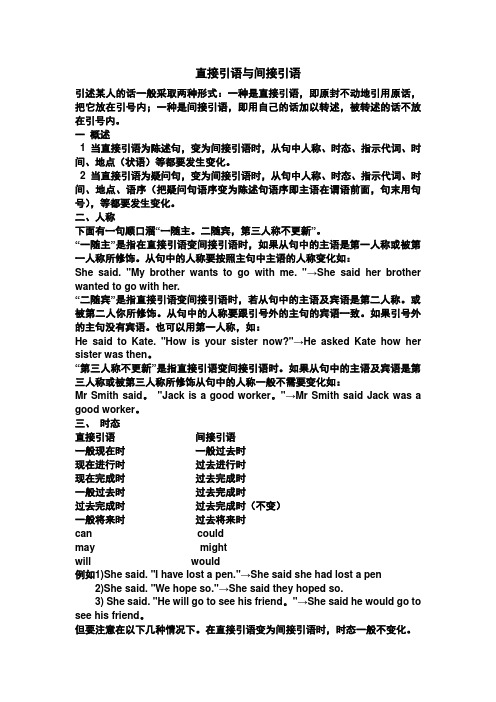
直接引语与间接引语引述某人的话一般采取两种形式:一种是直接引语,即原封不动地引用原话,把它放在引号内;一种是间接引语,即用自己的话加以转述,被转述的话不放在引号内。
一概述1 当直接引语为陈述句,变为间接引语时,从句中人称、时态、指示代词、时间、地点(状语)等都要发生变化。
2 当直接引语为疑问句,变为间接引语时,从句中人称、时态、指示代词、时间、地点、语序(把疑问句语序变为陈述句语序即主语在谓语前面,句末用句号),等都要发生变化。
二、人称下面有一句顺口溜“一随主。
二随宾,第三人称不更新”。
“一随主”是指在直接引语变间接引语时,如果从句中的主语是第一人称或被第一人称所修饰。
从句中的人称要按照主句中主语的人称变化如:She said. "My brother wants to go with me. "→She said her brother wanted to go with her.“二随宾”是指直接引语变间接引语时,若从句中的主语及宾语是第二人称。
或被第二人你所修饰。
从句中的人称要跟引号外的主句的宾语一致。
如果引号外的主句没有宾语。
也可以用第一人称,如:He said to Kate. "How is your sister now?"→He asked Kate how her sister was then。
“第三人称不更新”是指直接引语变间接引语时。
如果从句中的主语及宾语是第三人称或被第三人称所修饰从句中的人称一般不需要变化如:Mr Smith said。
"Jack is a good worker。
"→Mr Smith said Jack was a good worker。
三、时态直接引语间接引语一般现在时一般过去时现在进行时过去进行时现在完成时过去完成时一般过去时过去完成时过去完成时过去完成时(不变)一般将来时过去将来时can couldmay mightwill would例如1)She said. "I have lost a pen."→She said she had lost a pen2)She said. "We hope so."→She said they hoped so.3) She said. "He will go to see his friend。
- 1、下载文档前请自行甄别文档内容的完整性,平台不提供额外的编辑、内容补充、找答案等附加服务。
- 2、"仅部分预览"的文档,不可在线预览部分如存在完整性等问题,可反馈申请退款(可完整预览的文档不适用该条件!)。
- 3、如文档侵犯您的权益,请联系客服反馈,我们会尽快为您处理(人工客服工作时间:9:00-18:30)。
直接引语和间接引语详解与练习Company number:【WTUT-WT88Y-W8BBGB-BWYTT-19998】直接引语和间接引语一、概述引用或转述别人说的话时有两种方法:直接引述别人的原话,这叫做直接引语(direct speech)。
用自己的话转述别人的话,叫间接引语(indirect speech)。
一般地讲,直接引语前后要加引号,间接引语不用引号,而用宾语从句来表达。
Mr. Black said, “I'm busy.”布菜克先生说:“我很忙”。
(直接引语)Mr. Black said that he was busy.布菜克先生说他很忙。
(宾语从句是间接引语)从上例看来,直接引语改为间接引语时,除将直接引语改为宾语从句之外,还须对直接引语中的人称和时态进行相应的变化,如上例直接引语中的I改成了he, am则改成了was。
现将由直接引语改为间接引语时应注意的问题,分述如下:二、直接引语是陈述句时直接引语如果是陈述句,变为间接引语时,用连词that引导(that在口语中常省去),that从句之前用say、tell等动词,从句中的人称、时态、指示代词、时间状语、地点状语等要作相应的变化。
1、人称的变化直接引语改为间接引语人称要相应的变化,把直接引语中的第一人称(如:I,me,my,mine,we,us,our,ours)变为与主句的主语相一致的人称。
把直接引语中的第二人称(you,your,yours)变为和主句的间接宾语(即听话人,如无听话人,可根据上下文的体会人为确定一个人称)相一致的人称。
直接引语中的第三人称(he,him,his,she,her,hers, it,its, they, their,theirs,them)变为间接引语时,人称不变。
He said, “I like it very much.” 他说:“我非常喜欢它”。
→He said that he liked it very much.他说他非常喜欢它。
(I改为he, it不变)He said, “You told me this story.”他说:“你给我讲过这个故事。
”→He said that I had told him that story.他说我给他讲过那个故事。
(You改为I, me 改为him, told改为had told)He said to me, “She’s left her book in your room”.他对我说:“她把书放在你的房间里去了。
”He told me that she had left her book in my room.他对我说她把书放在我的房间里去了。
(She’s→she had,her不变,your→my)2、时态的变化(1)主句的谓语动词是一般过去时直接引语----间接引语:一般现在时--一般过去时现在进行时----过去进行时现在完成时----过去完成时一般过去时--过去完成时过去完成时----过去完成时(不变) 一般将来时----过去将来时一般将来进行时-----过去将来进行时一般将来完成时---过去将来完成时如主句的谓语动词是一般过去时,直接引语变间接引语时,从句的谓语动词在时态方面要作相应的变化。
直接引语改为间接引语时,动词时态相应变化表:He said, “I usually watch TV on Sunday.”他说:“我常在星期天看电视”。
→He said that he usually watched TV on Sunday.他说他常在星期天看电视。
He said, “I'm using the knife.”他说:“我正在用小刀。
”→He said that he was using the knife.他说他正在用小刀。
She said, “I have not heard from him since May.”她说:“自从五月份来我就没有收到他的来信。
”→She said that she had not heard f rom him since May. 她说自从五月份以来她就没收到他的来信。
He said,“I came to help you.”他说:“我来帮助你。
”→He said that he had come to help me.他说他来帮助我。
He said, “I had finished my homework before supper.”他说:“晚饭前我己做完了作业。
”→He said that he had finished his home work before supper.他说晚饭前他己做完了作业。
Zhou Lan said, “I'll do it after class.”周兰说:“下课后我就去做。
”→Zhou Lan said that she would do it after class.周兰说下课后她就去做。
He said, “I shall be doing my homework then.”他说:“那时我将正在做作业。
”→He said that he should be doing his homework then.他说那时他将正在做作业。
He said, “We shall have finished the work by that time.”他说:“我们将在那时以前完成工作。
”→He said that they should have finished the work by that time.他说他们将在那时以前完成工作。
注意:直接引语如果是客观真理、名人名言、与一个具体的过去时间连用说明客观事实时,变为间接引语时,时态不变。
The teacher said, “The earth is round. ”老师说:“地球是圆的。
”→The teacher said that the earth isround.老师说地球是圆的。
He said, “I was born in Shangdong in1965.”他说: “我1965年生于山东。
”→He said that he was born in Shangdong in 1965. 他说他1965年生于山东。
He said, “Columbus discovered America in 1492.”他说:“哥伦布在1492年发现了美洲。
”→He said Columbus discovered America in 1492.他说哥伦布在1492年发现了美洲。
(2)主句的谓语动词是现在时或将来时如果主句的谓语动词是现在时或将来时,直接引语变为间接引语时,时态一律不变He says, “I finished the work.”他说:“我做完工作了。
”He says that he finished the work.他说他做完工作了。
He will say, “I have watered the flowers.”他会说:“我己经浇花了。
”He will say he has watered the flowers.他会说他己经浇花了。
3、指示代词、时间状语和地点状语的相应变化见下表:直接引语-间接引语this/these-that/those now- then today-that day tonight-that nightthis week(month…) -that week (month…) yesterday-the day beforelast week (month…)-the week (month…)before two weeks (month)ago-two weeks (months)before tomorrow-the next day next week (month…)- the next week (month…)指示代词,时间状语,地点状语Here-there动词:Come- go, bring- takeHe said, “I met Mr. Smith this morning.”他说“我今天早晨见到史密斯了。
”He said that he had met Mr. Smith that morning.他说他那天早晨见到史密斯了。
He said, “We went to the cinema yesterday.” 他说:“我们昨天去电影院了。
”→He said they had gone to the cinema the day before. 他说前一天他们去电影院了。
Lily said, “I will come back next month.”莉莉说:“我下个月回来。
”→Lily said that she would go back the next month. 莉莉说她下一个月就回去。
He said, “It is nine o'clock k now.”他说:“现在九点了。
”→He said that it was nine o'clock then.他说那时九点了。
He said, “I haven't seen her today.”他说:“今天我没见到她。
”→He said that he hadn't seen her that day.他说那天他没有见到她。
She said, “I went there yesterday.”她说:“昨天我去了那儿。
”→She said that she had gone there the day before.她说前一天她去了那儿。
She said, “I'll go there tomorrow.”她说:“明天我将去那儿。
”→She said that she would go there the next day.她说第二天她将去那儿。
He said, “My sister was here three days ago.”他说:“三天前我妹妹在这儿。
”→He said that his sister had been there three days before.他说三天前他妹妹在那儿。
(here→there;ago→before)She said, “I will come here this evening.”她说:“今晚我将来这儿。
”→She said that she would go there that evening.她说那晚她将去那儿。
